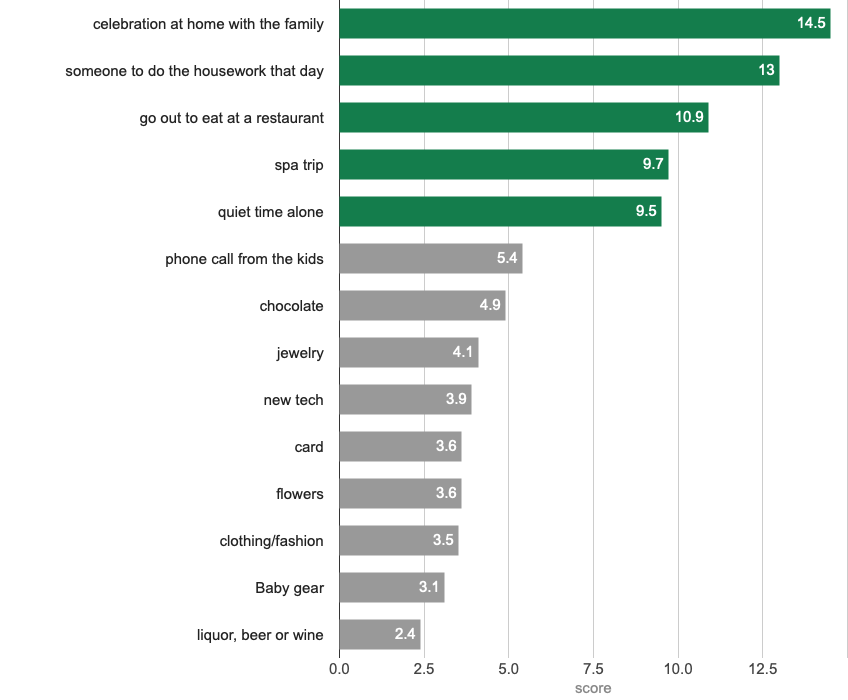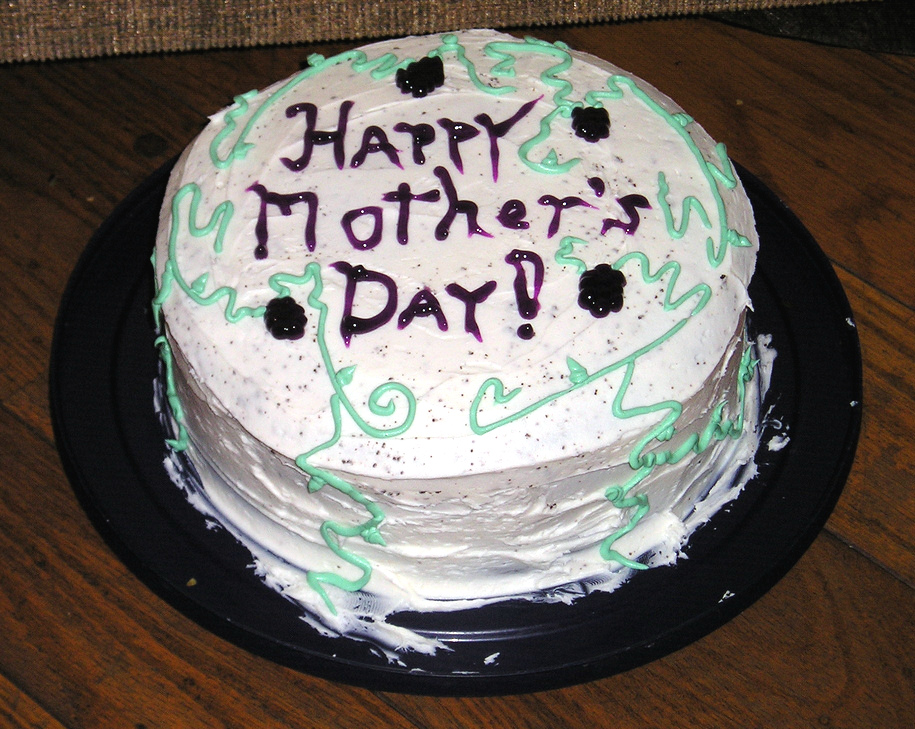Mother’s Day: you cannot mess this one up. Do you give her jewelry, a card, her favorite alcoholic beverage, clothing, flowers?
Moms told pairLab what they really want in a public survey run between April 29 and May 1, 2022. The answer may surprise you (it surprised me and changed my ideas for Mother’s Day). Let’s take a look.
How this Survey was Conducted (Methodology)
pairLab conducted a public survey to see what mom really wants for Mother’s Day in 2022.
How does pairLab figure it out? pairLab takes a list of ideas, shows them in pairs to survey participants (in this case moms), and asks them to vote for the idea they like more. Once a vote is cast, the participant tells pairLab how strongly they feel about their choice. pairLab’s algorithm crunches the numbers, and voila: we get a rank order of the best Mother’s Day gifts by how passionate moms are about them.
What gift ideas were tested? This pairLab expairiment was seeded with 13 gift ideas (here in alphabetical order):
- card
- celebration at home with the family
- chocolate
- clothing/fashion
- flowers
- go out to eat at a restaurant
- jewelry
- liquor, beer or wine
- new tech
- phone call from the kids
- quiet time alone
- someone to do the housework that day
- spa trip
Of course, being a pairLab expairiment, which crowdsources ideas, participants were invited to suggest their own gift ideas, which were fed back into the survey to be voted on by subsequent participants. Moms suggested one gift idea that met the survey criteria (“baby gear”).
The survey was posted as a paid Facebook ad to attract participants over the course of three days (no incentive was offered). The post targeted:
- Female gender
- New parents
- Parents with toddlers
- Parents with preschoolers
- Parents with preteens
- Parents with teenagers
- Parents with adult children
- Living in the United States
Note that Facebook did not offer parents with children in elementary school as a target audience.
In all, 43 participants provided data within acceptable parameters and voted on 91 theoretical gift matchups for a total of 807 pair votes.
Thank you to all the moms who participated in this survey.
Segments
pairLab buckets survey participants into segments. Segmenting participant data allows us to see what each segment feels is important and allows us to compare segment results. Comparing segments shows how each one prioritizes ideas differently, leading to deep insights.
This survey asked one segment question (the percentage of participants is shown in parentheses):
- I am a mom of ...
- I am expecting my first child (4.7%)
- preschool-age children (69.8%)
- elementary school children (7%)
- middle/high school children (4.7%)
- college-age children (4.7%)
- adult children (9.3%)
- I am not a mom (0%)
When I saw the segments favoring “preschool-age children,” I changed the Facebook post targeting to favor the other segments. The change affected the segments very little, leading me to believe Facebook knows a lot less about its audience than it thinks.
Results
What does mom really want? She wants to feel like she’s taken care of, as reflected by the top-four ideas: celebration at home with the family, someone to do the housework that day, go out to eat at a restaurant, spa trip. Finishing the top five was quiet time alone. Here’s a graphical look at the results:

How to read this chart: pairLab shows rankings in two dimensions. The first is an ordinal ranking (moms ranked celebration at home with the family as the thing they'd most want for Mother's Day). The second dimension reflects preference and is expressed as a “pair score” (the number assigned to each Mother’s Day gift). A pair score is a unitless measure that shows how strongly survey participants prefer that Mother’s Day gift as compared to any other. We can use pair scores to compare two Mother’s Day gifts. For example, we can say that “moms prefer celebration at home with the family 4 times more than a card.” (14.5/3.6 = 4). Green bars show rankings above the mean for all gift ideas, gray bars show rankings below the mean.
Looking at these data, mom isn’t all that interested in physical gifts, which all ranked at 7 or below. Most importantly, she doesn't want a bottle of wine (which, along with liquor and beer, came in dead last). Mom wants a personal experience that gives her a break and makes her feel cared for, whether it's with the family or by herself.
How Moms with Different Aged Children Compare
Since pairLab can compare the importance of ideas among different segments, how did each stack up against the others? Since moms with preschool-age children were the majority of participants, we’ll compare them with the other segments. (I’ll use “PAC mom” as a shorthand for “moms with preschool-age children.”)
Compared to PAC mom, moms expecting their first child thought these gifts were more important:
- Baby gear
- Jewelry
- New tech
Compared to PAC moms, moms with elementary school-aged children and moms with college-aged children valued flowers as an important gift.
Compared to PAC moms, moms with middle/high school-aged children valued jewelry as an important gift.
Compared to PAC moms, moms with adult children valued a card and alcohol as important gifts.
What is consistent across all mom segments?
- Celebration at home with the family
- Someone to do the housework that day
- Go out to eat at a restaurant
- Spa trip
All moms highly value these Mother's Day gifts. You can't go wrong with these. (And for businesses looking to help their customers: Focus on experiences for mom that make her feel appreciated.)
What Am I Going to Get My Mom for Mother’s Day?
Actually, just a call this year (ranked sixth) because I’ll be away and unable to see her. (She won't be upset. She got a good consolation prize. It was her birthday last week and the family took her out to dinner.)
In any event, in spite of all the commercials giving us terrific gift ideas that they say mom will absolutely love, this pairLab survey of moms tells us something different. Mom wants you to take care of her.
Still, don’t forget to give her a card (though she'll be three times happier if you take out to a restaurant as well).
pairLab Can Help You Figure Out How to Take Care of Your Customers
pairLab is an expert tool for finding your customers’ wants, needs, pains and gains, and it helps you make informed decisions about your products. The results are stunning. Learn more and get the free trial.
